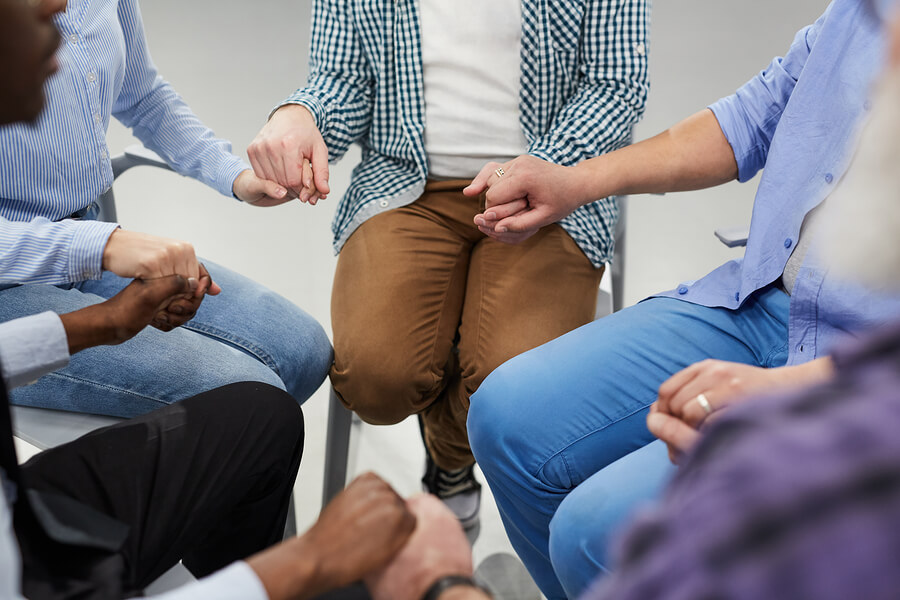
If you are using 12-step Alcohol Anonymous (AA) meetings as one means of maintaining sobriety after rehab, another person has likely suggested that you seek out a sponsor. This may seem like a daunting task, but, with guidance, you should be able to identify someone who can serve as a voice of reason and say and do what is necessary to help you remain accountable throughout recovery.
What Is an AA Sponsor?
Alcoholics Anonymous defines a sponsor as “an alcoholic who has made some progress in the recovery program shares that experience on a continuous, individual basis with another alcoholic who is attempting to attain or maintain sobriety through AA.”
Simply put, a sponsor is a person who has been in the program and has been sober for an extended period and can help someone who is newly sober stay that way. They act as a mentor or guide of sorts, someone to whom individuals new to AA can ask for advice and lead newly sober meeting attendees through the twelve steps.
Considerations in Choosing an AA Sponsor
There are several factors you should take into account when deciding upon a person who will serve as your AA sponsor.
Consider the amount of time a potential sponsor has been sober. The general rule is that a person who volunteers to be an AA sponsor should have no less than one year of sobriety under their belt. This proves that a potential sponsor has been working the program, and it has helped him or her maintain sobriety. In turn, he or she will, therefore, be able to pass on their successful strategies and experiences to a sponsee. Moreover, a person who has been sober for a significant amount of time has gained more insight into what sobriety is really like after the early months of recovery.
Consider the sex/gender of the sponsor. It has been suggested that women should sponsor other women, and men should sponsor other men. For many, it is more comfortable to have discussions with a person of the same sex or gender regarding the sometimes private information that is shared in a sponsor-sponsee relationship.
Same-sex sponsorship can also sometimes limit the likelihood of romantic feelings from developing, which can be very distracting and sabotage sobriety and recovery, especially in the first year. That said, this tradition does not take into account gender identities or sexual orientation. Moreover, the core of this idea is that you should pick a person who you believe you will be comfortable with and not be tempted to pursue romantically.
Research a potential sponsor’s commitment to sobriety. Ask the following: do they have their own sponsor? How diligently do they work the twelve steps? Do they appear to be happy and satisfied with sobriety and their life? A “no” answer to any of these questions may indicate that the potential sponsor may not be the right person for the role because a qualified sponsor should practice what he or she preaches.

Consider how many other sponsees he or she currently has. Although it’s a good sign when a potential sponsor has other sponsees, if they have more than two or three, it might be wise to find another sponsor who has fewer sponsees and has the time to devote more individualized support.
Make sure the potential sponsor wants to be a sponsor. Just because someone has worked the program for some time does not necessarily mean they are comfortable enough to be willing to sponsor you. Typically, at AA meetings, however, there will be a point in which potential sponsors will raise their hands. Take note of this to avoid approaching a person who is not actively willing to be a sponsor.
Consider the personality of a potential sponsor. Sometimes having a common denominator such as being in recovery is not enough to forge a connection. While many people may appreciate the brutal honesty of some sponsors when it comes to accountability, others may not take so well to this approach. It’s important to find someone who is a good match for your personality and needs, and if you find one who is not, do not hesitate to let them know and seek out a new sponsor who is a better fit.
Getting Treatment for Addiction
Attending AA meetings and getting a sponsor has helped millions of people get sober and maintain long-lasting abstinence. However, AA does not always serve well as an alternative for professional treatment. Instead, it should be just one vital tool used as part of a more intensive, comprehensive approach.
Recovery by the Sea offers evidence-based, individualized treatment programs designed to treat addiction as well as all aspects of a person’s health and well-being. Essential services include behavioral therapy, counseling, group support, aftercare planning, and much, much more.
If you are struggling to escape the clutches of drug or alcohol addiction, we urge you to contact us today and discover how we can help you free yourself once and for all and begin to enjoy the happy and healthy life you deserve!
READ THIS NEXT: Step 1 of Alcoholics Anonymous